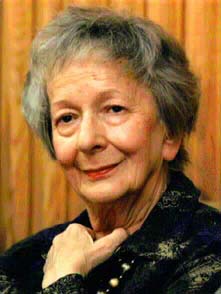|
|
|
|
Wislawa
Szymborska
|
|
 |
Is there then a world
where I rule absolutely on fate? A time I bind with chains of signs? An existence become endless at my bidding? The joy of writing. The power of preserving. Revenge of a mortal hand. (from 'The Joy of Writing,', 1967) |
|
Polish
poet and translator, who was awarded the Nobel Prize for Literature in
1996, at the age of seventy-three. Szymborska is one of the few woman
poets who have received the prize. Her early works were born more or less
within the straitjacket of the Socialist Realism. Later she has expressed
her pessimism about the future of mankind. While skepticism has marked
Szymborska's views of the human condition, its has not stopped her from
believing in the power of words and the joy arising from imagination.
Szymborska often uses ordinary speech and proverbs but gives them a fresh
and arresting meaning.
Wislawa Szymborska was born in Bnin (now part of Kornick) in western Poland. In 1931 her family moved to Krakow. They lived near the railway station. From the kitchen window Szymborska watched trains with enthusiasm. However, she never left Poland. With her friends she created a theater game based on the works of Henryk Sienkiewicz. At the age of nine she become interested in films - especially those which were forbidden to her. Karl Freund's Mummy (1932), starring Boris Karloff, inspired Szymborska to visit a history museum, which had two mummies in its care. During World War II, when German occupied Poland, her mother refused to leave Krakow. Szymborska attended illegal classes and joined an underground theater, where she worked as a prompter. In a wartime writing she stated, that "Hitler gives the Germans something to be enthusiastic about and offer up their lives for that, for those Germans, Hitler is great. Don't you understand that the power of a movement depends on the human beings it produces?" After the war, from 1945 to 1948, Szymborska studied Polish literature and sociology at the Jagiellonian University in Krakow. From 1953 to 1981 she worked on the Krakow literary magazine Zycie Literacia as poetry editor and columnist. As a poet Szymborska made her debut with the poem Szukam slowa which was published in the newspaper Dziennik Polski in 1945. Three years later she finished her fist collection of poems, but the book was not published. The Communist had gained power tightening their cultural policy and Szymborska's work was considered too complex and bourgeois. She returned to the work, made it more political and her first collection DLAGTEGO ZYJEMY, appeared in 1952. Szymborska have also published collections of literary columns, several of which first appeared in Zycie Literacia. Like many Poles, Szymborska became disillusioned with communism. 'I looked back in terror where to step next...' Her later work have been more personal and relatively apolitical, although he has noted "Apolitical poems are political too" in 'Children of This Age'. The 1957 collection of poems, WOLANIE DO YETI (calling out to Yeti), marks her first break with socialist-realist literature. In 'Still Life with Toy Balloon' she wrote: "Fly off through the open window, / fly off into the wide world, / let someone cry out: Oh! / so I can weep." Ten years later published STO POCIECH is considered Szymborska's first work of her mature period. When Communism claimed it was the final answer to the question about ideal form of society, Szymborska admitted that she has no knowledge of Utopia, but only an ironic view of it as an "island where everything comes clear." Her role in the society she saw as vague: "I am ignorant of the role I perform. / All I know is it's mine, can't be exchanged." Szymborska has been married twice. Since the early 1990s she has been a widow and lived in Krakow. After the Nobel award she retrested to Zakopane to escape reporters and well-wishers and to write her acceptance speech. "I'm a private person," she told in a telephone conversation to Czeslaw Milosz, her countryman, who had won the prize in 1980, and emigrated to the United States. "... inspiration is not the exclusive privilege of poets or artists generally. There is, has been, and will always be a certain group of people whom inspiration visits. It's made up of all those who've consciously chosen their calling and do their job with love and imagination... Whatever inspiration is, it's born from a continuous "I don't know."'(from Nobel Lecture, 1996) Szymborska's two poems published in the magazine Orda (1/2000) expressed her feelings of aging and strangeness - she sees that we are only visitors in a cosmic party. Before and after the Nobel Prize Szymborska have avoided literary gatherings, but her personal example and devotion to poetry has inspired young women all over the world to choose career in literature. CHWILA (2002), published when Szymborska was 79, contained 23 poems. Szymborska's writing in Nonrequired Reading: Prose Pieces (2002) is misleadingly casual - her incisive views on scientists, gardening, fairy tales, fashion, and other subjects stand up for repeated readings without losing their freshness.
|
|